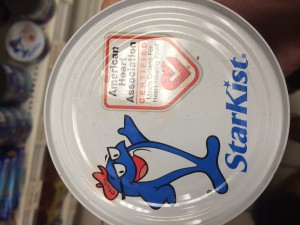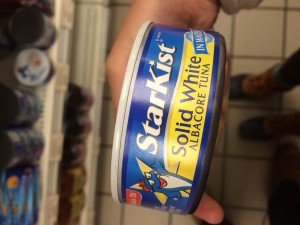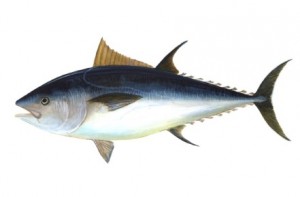The product that I have chosen to use is Starkist Tuna Fillet. I found this tiny little tin in Wawa, and couldn’t help but laugh a little bit when I looked down and saw a big, blue, smiling fish looking at me with its fin directing my attention towards the product’s label. My first reaction was to recognize immediately that this fish, however blatantly silly it may be, is certainly no tuna. I think it is important to really see this difference, so here is what an actual Tuna looks like:
Sure, tuna can be blueish on the outside, but nothing like the image on the tin- this is some made up cartoon character. Just from the outside, I wouldn’t feel too ridiculous in making an assumption that the contents of the tin would be some sort of blue silly puddy. Further, the fish looks as though it is possibly female, given the pink hair bow, and has impaired sight, judging from the pair of glasses resting in front of its eyes. Perhaps this misrepresentation and blatant anthropomorphism of the fish is intentional; perhaps it is a way of drawing the mind away from the very concept of the diced up tuna inside.
Next, bringing this image into the context of what Foer has written about the manner in which fish, especially tuna, are caught, it is all the more hysterical (in a dark sense) to see this smiling blue creature looking up at me. According to Foer, this smiling tuna is essentially representing a species which is the focus of a human genocide. Foer shows that our tuna fishing is unsustainable and reckless, and literally employs techniques borrowed from war-time capital. So the net takeaway is basically that this happy, blue, female fish is the poster child for a devastated species, not to mention the other dozens of species that are also devastated as a result of a excessively broad fishing techniques. Without even establishing an opinion on the subject of industrial fishing, just imagine for a moment the smiling face of someone like Flo from the Progressive Insurance TV commercials pasted on top of a massive crate holding dead human bodies that were the recent defenseless casualties of a massacre, advertising the transport and morgue services.
“We happily bring you deceased human beings quicker and cheaper than anyone else!”
I don’t want to act like I’m somehow equating the severity of those two situations, but really, the same concept applies to an extent – it’s just a little weird to put the smiling face of a given species on top of a tin full of its obliterated remains. Sure, they’re just fish. But the really messed up thing is that that advertisement is essentially expecting you to understand the death of something as a smiling, happy event, and that somehow the dead tuna is encouraging you to eat it – giving you a justification which is something along the lines of, “well if the Tuna doesn’t seem to mind, I guess I shouldn’t!”
The business is operating under the understanding that their customers legitimately don’t care in the slightest about the fact that an organic, living thing was killed to support their own organic existence. I’m one of those annoying people who isn’t really for or against the industrial level consumption of land or sea creatures (I still eat fish and meat but constantly question the fact that I do), but I do believe that there should be some level of outward respect given to something that was graced, as we were, with the ability to live on this earth in its own element. I’d like to think that even in the midst of the massive economies of scale (a doubling of inputs such as labor or capital into an industry resulting in a more than doubling of output to bring about massive profits) achieved in the fishing and farming industries, there is still a way to respect the life of the deceased organism and avoid anthropomorphism of it without losing significant demand for it. Maybe no picture at all, or maybe just the standard image of a tuna that I provided above. When I look at this tin of tuna, I’m not really moved astronomically one way or the other, but I do feel myself grimacing a little and thinking, “ok, this is a little bit excessive and unnecessary. Maybe this could be done differently.”




Leave a Reply